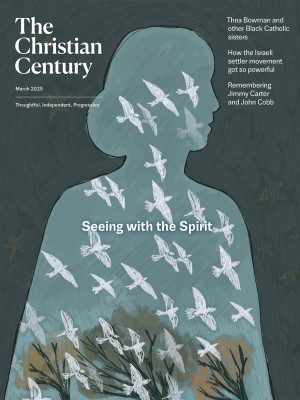Free Will: A Consideration
Providence has a wild, rough, incalculable
road.
—Ralph Waldo Emerson
Prelude
The flying godwit
soars 8000 miles nonstop
from Alaska to China’s Yellow River.
It’s not its resilience we most admire
nor its sheer hardheadedness;
it’s the calculus, some bird radar
pulling it forward, a threaded
needle, its eye way above
water
Read our latest issue or browse back issues.
Winter Work
Waldo waits for the water to freeze before walking across
the Great River to arrive in
Kalamazoo or wherever next
he will speak. Even so, the chill
wind invades his cloak, his scarf,
and threatens his gait. He slides.
Last week, as he stood tall, patient,
before a crowd somewhere, someone
said he resembled a perpendicular coffin.
Well, yes: hidden behind the comfort
of aphorism and the blazing quilt
of certainty, his spirit has plummeted,
careened from transcendence
by the death of a child, his own,
the hurt seamed into his heart, still
pulsating, one lyceum after another,
through one lecture, maybe two,
another day x’d off the calendar.
An Interlude
Free will, Nabokov writes
in a sly and caustic note,
“snaps its rainbow fingers”
to dispute our every doubt.
Perhaps. Yet we must consider
going this way or that, the paths
tangled where we least suspect.
Sometimes we’re blown about,
buffeted into fearsome lands,
labyrinthine folds, no string
to sift, no needle to thread.
Other times we feel we’re saved,
borne up on spirit we neither
know nor understand.
Spring
Every spirit makes its house, but afterwards the
house confines the spirit.
—Ralph Waldo Emerson
After the heavy rains, a pinch
of light through the trees, and then a vibrant seam
of color as the evening swells
robust, a fine suture
of sun and calm.
The scholar sits still,
as though before an altar,
to what god he does not know.
The old robes don’t fit:
they’re yesterday’s choices
and a bit threadbare.
When one’s words are etched
into platitude, embroidered
as fact, is one not bound
and gagged and lost?
What a strange knot
in the golden thread of a life
exemplary to a fault!
A Postlude, Lightsome
Lidian, wife of Waldo, who called
him Mr. E for half a century,
might be deemed a sentimental
fool: In concern for a rat caught
in the chimney she placed
bread and cheese there.
She so fretted that her chickens’
feet were cold in those northern
winters (even her own blanket
failed to warm their scaly toes),
that her graceless friend
Henry David, ever adept
at construction, stitched
for them leather shoes.





